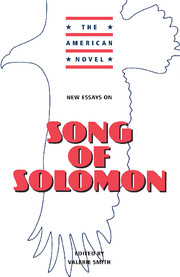Book contents
- Frontmatter
- Contents
- Series Editor's Preface
- 1 Introduction
- 2 From Orality to Literacy: Oral Memory in Toni Morrison's Song of Solomon
- 3 Call and Response: Voice, Community, and Dialogic Structures in Toni Morrison's Song of Solomon
- 4 Knowing Their Names: Toni Morrison's Song of Solomon
- 5 The Postmodernist Rag: Political Identity and the Vernacular in Song of Solomon
- Notes on Contributors
- Selected Bibliography
1 - Introduction
Published online by Cambridge University Press: 06 July 2010
- Frontmatter
- Contents
- Series Editor's Preface
- 1 Introduction
- 2 From Orality to Literacy: Oral Memory in Toni Morrison's Song of Solomon
- 3 Call and Response: Voice, Community, and Dialogic Structures in Toni Morrison's Song of Solomon
- 4 Knowing Their Names: Toni Morrison's Song of Solomon
- 5 The Postmodernist Rag: Political Identity and the Vernacular in Song of Solomon
- Notes on Contributors
- Selected Bibliography
Summary
AFRICAN American cultural workers – writers, artists, filmmakers, etc. – are often granted the dubious accolade of “universal” or “more than black.” Such designations are meant to suggest that their accomplishments appeal to an audience larger than the African American community. Unfortunately, they suggest as well that the category of “the universal” transcends the particularities and contingencies of cultural specificity and that racial specificity is less desirable than putative universality.
Recent debates about the literary canon (the body of works historically and commonly considered great) have held the notion of universality up to heightened scrutiny. Defenders of the traditional canon typically argue that texts historically judged as great meet timeless artistic criteria, standards that transcend constructions of race, gender or ethnicity. When challenged to defend the practice of largely excluding literature written by people of color and by white women, they accuse revisionists of confusing politics or demographics with literary standards. Those who would enshrine U.S. literary history as it has commonly been written thus deny that the predominance of white male writers bespeaks a set of class or political interests.
In contrast, critics who seek to expand the canon of U.S. letters are likely to argue that all literary judgments are ideologically grounded; by this light, the denial of political interests reflects a desire to maintain the status quo. They posit as well that it is in the very nature of power to obscure its own agency and contingencies. Traditionalists thus would accuse works by African American writers, for instance, of being about race while works by white writers are not. Likewise, they would argue that works by women are about gender while texts by men are not.
- Type
- Chapter
- Information
- New Essays on Song of Solomon , pp. 1 - 18Publisher: Cambridge University PressPrint publication year: 1995
- 1
- Cited by



